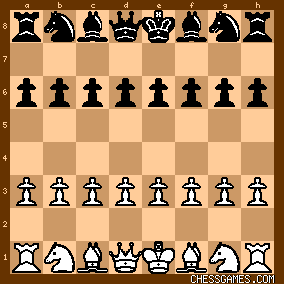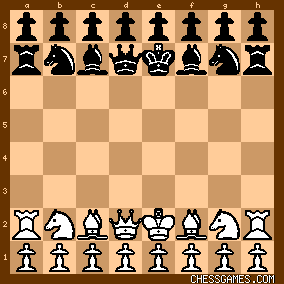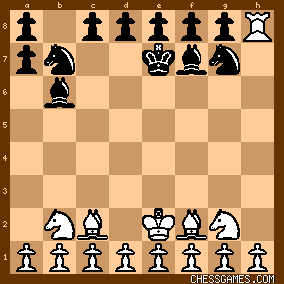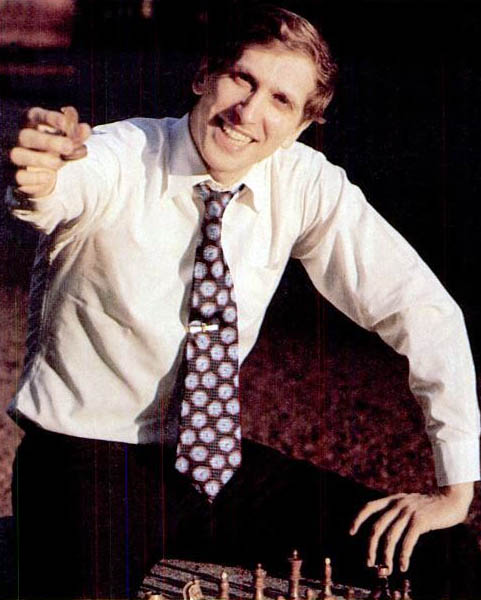|
< Earlier Kibitzing · PAGE 124 OF 160 ·
Later Kibitzing> |
| Feb-25-21 | | metatron2: <keypusher: I'd be interested to see what happened if you repeated the experiment with a new version of SF> I think I played it around 2013-2014 but I am not sure. So it was probably SF 4 or 5. SF is now way stronger, my PC is much stronger now, and I am older now, so my odds are quite slim today, but I'll try to do it when I'll get the time and mood.. <keypusher: I think you might be overestimating 2000 players a little bit. But I'm not sure. The main problem is lack of modern data> I was talking mainly from my own experience.
I'm pretty good at giving odds to weak players. I always beat with queen odds, amateurs that consider themselves pretty good, but that never studied chess properly (were never club members), and its always nice to see how surprised they are when that happens.. But somewhere between 1300-1400 rating, if my opponent decides to play it safe (and at level, with an extra queen, they are good enough to do that), then he has a clear edge. With rook odds its a bit different, because the rook joins the game later, giving me much more chances to complicate. But again, in slow blitz and around 1600 rating, if my opponent decides to play it safe, then he usually has the edge. The thing is that when you give rook odds, you are not just lost, you are dead lost.
And 2000 rated player is a good player, so if he decides to play real safe, not to take any chances, not to go for king attack on opposite wings races, and things like that, then there is no reason that he won't be able convert his easily winning position against a strong GM. (And with queen odds in 5+3 blitz, I think Carlsen would just resign on move 1 vs 2000 rated player). If you take a young GM who is also very good in blitz, and is also very tactical and aggressive, and he really knows how to mess things up in lost positions, then maybe I will give him better chances vs 2000 rated player in blitz. maybe. But with an average GM rated around 2500, who is not especially good in blitz, I would go with the 2000 rated player without thinking twice. <keypusher: Beautiful stuff from Tarrasch. But even though I've certainly made worse moves than Romberg did there, I'd wouldn't butcher the opening quite that way> Yeah, Tarrash was really impressive there..
It always surprises me that in the old days, there were so few players who could really play chess (less than 10 probably around the world), and the rest were like total patzers.
But the good players were really good, so there was such a huge jump between the rest and the top 10, that it is quite puzzling (and impressive) how these guys actually got so good ? they didn't really have anyone to train with, learn from , etc. So they practically invented chess, which is such a complex game.. |
|
Feb-26-21
 | | keypusher: <metatron2> Well, sounds like you have as much experience as anyone does with odds these days. So your opinion carries weight. In the 19th century masters had a lot of experience playing at odds. So they were good at it. But a lot of their skill seemed to lie in taking advantage of the lack of chess erudition of their opponents. I'd still love to see another odds tournament, though. You make a good point about how impressed we should be with the few players of 100+ years ago who could play well. Tarrasch had the benefit of playing with Anderssen as a youngster. But obviously f/e Morphy didn't have anything like that. When it came to the middlegame, there weren't really even any good chessbooks! |
|
| Feb-26-21 | | Petrosianic: Somewhere I have a list of non-material odds that I'd like to see used, just to see how valuable they are. I'd have to look for it, to find the full list, but one of them is that the odds giver can't castle, the receiver can. Another one was the odds receiver can pass on any move, throwing zugzwang out the window for him, and turning a lot of endings upside down. |
|
Feb-28-21
 | | HeMateMe: Bobby Fischer: "I hate chess."
<https://www.youtube.com/watch?v=P34...> |
|
Mar-09-21
 | | Diocletian: Happy Birthday, Bob 2021 |
|
| Mar-12-21 | | todicav23: Dick Cavett's Chess Lesson:
https://www.youtube.com/watch?v=Y-H... |
|
Mar-12-21
 | | harrylime: I'm pretty certain without even checking that Leonid Stein's page is better than this on this site ... lol |
|
Mar-12-21
 | | harrylime: Wow. The Robert James Fischer HATERS on this site !! .. Loike ... lol xxx |
|
Mar-12-21
 | | harrylime: MAKES ME LOVE RJF MORE ! lol lol xxxxxx |
|
| Mar-13-21 | | devere: The world's best chess player interviewed by the world's best interviewer https://www.youtube.com/watch?v=Qxv... |
|
Mar-14-21
 | | MissScarlett: Damn, I was expecting Kasparov on <Wogan>. |
|
| Mar-15-21 | | Petrosianic: <harry david chapman>: <MAKES ME LOVE RJF MORE ! lol lol xxxxxx> We all know you hate him. Goodness knows you prove it often enough, duh, lol. |
|
| Mar-15-21 | | Petrosianic: I've never been clear on why Chess 960 is almost never called Fischerrandom now, even though Fischer invented it and gave it that name. I tried Wikipedia, and it explained the What, but not the Why: <The variant has held a number of different names. It was originally known as "Fischerandom", the name given by Fischer. Fischer random chess is the official term, used by FIDE.Hans-Walter Schmitt, chairman of the Frankfurt Chess Tigers e.V. and an advocate of the variant, started a brainstorming process for creating a new name, which had to meet the requirements of leading grandmasters; specifically, the new name and its parts: should not contain part of the name of any grandmaster;
should not include negatively biased or "spongy" elements (such as "random" or "freestyle"); and
should be universally understood.
The effort culminated in the name choice "Chess960" – derived from the number of different possible starting positions.[citation needed] Fischer never publicly expressed an opinion on the name "Chess960".> So, here are my questions.
1. Why did <anybody> need to create a new name, least of all the Frankfurt Chess Tigers? If Dragon's Lair Comics and Games decides that "Moby Dick" needs a new title, and decides to change it to "Thar She Blows!", will the whole literary world bow to that? 2. Who says the name can't contain the name of a Grandmaster? What's wrong with that? Capablanca Chess does. 3. Similarly, what's wrong with "Random"? I don't agree that that's a negative word, and I'm not sure what "spongy" means in this context. 4. Fischerrandom was universally understood, "Chess960" isn't. At least it's not intuitively obvious that there are exactly 960 starting positions. (How many of us have checked that out for themselves?) I still call it Fischerrandom, and if anybody doesn't understand that, it's the fault of the Frankfurt Chess Tigers, not me. |
|
| Mar-15-21 | | Petrosianic: According to this, at least FIDE still uses the name "Fischerrandom". But unless somebody can give a better reason for the name change than the ones given here, I think we should pester places like chess.com, that use "Chess 960" into calling it by its proper name. |
|
| Mar-15-21 | | Petrosianic: Confirmed. FIDE does still call it Fischer Random. https://www.fide.com/news/175
As a result, I just clicked on Make a Suggestion at Chess.com, and fired off this. If anyone wants to steal it and submit it themselves, feel free: <The official name of "Chess960", the name given to it by its creator, and recognized by FIDE, is "Fischerrandom". That's what it should be called here, rather than some nickname.> |
|
Mar-15-21
 | | AylerKupp: <Petrosianic> Confirmed. FIDE does still call it Fischer Random.> FIDE seems to have a schizophrenic attitude when referring to FischerRandom / Chess360. Yes, they occasionally refer to it as FischerRandom chess as the link you provided for the article from 2019 shows. But <officially>, as in the current FIDE Handbook describing the FIDE Laws of Chess in effect from 1 January 2018 (https://handbook.fide.com/chapter/E...), this chess variant is referred to as Chess360. So I would hardly call it a "nickname". And, if you do, then it's an <official> "nickname". As well as its "proper" name as far as FIDE is concerned. But what else did you expect from FIDE, consistency? Obviously those writing FIDE's official rules are not the same people writing FIDE's official press releases, or maybe they are the same people and changed their minds somewhere between 2018 and 2019. Then again, that's hardly unusual. But officially, the name of this chess variant is Chess360 as far as FIDE is concerned. Maybe, like Kramnik - Topalov World Championship Match (2006), a unifying FischerRandom / Chess360 match could be played, one player playing FischerRandom and the other playing Chess360. Whichever variant of the name the match winner played would be selected as FIDE's official name for that variant in the next release of the FIDE Handbook. Now, should we properly refer to FischerRandom / Chess360 as a "chess variant" rather than "chess"? Maybe its proper name should be "ChessVariant360". :-) Personally, I like "ChessCCCLX" (Roman) or "Chess168" (hex). And in particular I like "Chess000101101000" because, as the joke goes, "The world is divided into 10 types of people, those that understand binary and those who don't." But what else would you expect from a sick mind like mine? |
|
| Mar-15-21 | | Petrosianic: I guess alarm bells should have gone off when I said FIDE got it right, and kept looking. But at least it looks like they've gotten it partially right. I don't like Chess 960 because if we name variants by the number of starting positions, then EVERY variant that isn't shuffle chess (as well as regular chess itself), should be called Chess 1. Clearly we can't name variants that way. Also, I can't think of any other version, even of shuffle chess, that's named by the number of starting positions it has. Chess 960 is a mega-wonky name. A friend of mine suggested it should be called AnythingButFischer Random, and have done with it. |
|
| Mar-15-21 | | RookFile: I remember it seemed strange when Fischer introduced a chess clock that added increments.
It also seemed strange when he created FischerRandom chess. But as time goes on, these ideas have gained full acceptance. It shows that Fischer was ahead of his time further adds to his rich contributions to the great game. |
|
| Mar-15-21 | | Petrosianic: Well, of the two things you name, the clock has been the more influential of the two. Pretty much every tournament these days uses increments. In fact, I miss the thrill of trying to make a time control and get a fresh supply of time. These days G/30 is common. But before Sudden Death, there was a time control called 30/30 that was a lot of fun. There even used to be a US 30/30 Open. These days most servers don't even have an OPTION to play with time controls like that. Fischer Random is, perhaps the best form of shuffle chess, but it hasn't gotten AS much attention as the clock. (I also like a forgotten variant from the 70's called "Pre Chess", where the players spend the first 8 moves placing their own pieces on the first rank). I've spent the last several days trying to get ratings in every variant on their leaderboards, because when you do, you can see how many "Active" players there are (people who have played at least 20 games in the last 3 months). I don't have ratings in Fog of War Blitz/Bullet/Rapid yet, but the most popular variant on chess.com is Atomic Blitz (11,832 active players). 2nd most popular is Giveaway Blitz (about a quarter as popular as Atomic Blitz. The least popular one I've found is Fog of War Hyper, and I'm not surprised. Fog of War means that you can only see squares that you're attacking, and Hyper means 15 seconds for the whole game. I hate it. But Fischer Random only had 89 active players last I looked, and with only a piddling 1900 rating, I'm actually #6 on their list. I don't care much for Giveaway. Loser's Chess (which ICC has but chess.com doesn't) is much better. Of their variants, I seem to enjoy Fischer Random, 3 Check and King of the Hill the most. The most popular of these is King, with 367 active players (or about 3% of what Atomic Blitz has). I'm not surprised Atomic is so popular. It's short and has keen explosions. But Fischer Random should be a lot more popular than it is. |
|
| Mar-15-21 | | Z 000000001: Does anybody know what the title of the 1910 book <László Polgár> showed Fischer where <Izidor Gross> supposedly already practically invented <Fischer Random>? (As mentioned on wiki)
. |
|
| Mar-15-21 | | Petrosianic: <Z 000000001> Not quite. Actually Wiki says pretty much the opposite of what you claimed. It says that Gross's game was a <forerunner> (nobody claimed Fischer invented shuffle chess, only Fischer Random), but that Fischer <changed the rules> to make his version. So, far from Wiki saying that the two games were practically the same, it pretty much says that they weren't. |
|
| Mar-16-21 | | Z 000000001: <Petrosianic> note I used the rather practical adverb, "practically" - as in <"practically invented">. That pretty much gives me a 5-lane highway of latitude in interpreting the matter - and so I reject your assertion that wiki claimed the opposite (see below for more). If I had perhaps dug out the original versions of "shuffle chess" that wiki mentioned, from 1792 or 1842, then you might have a better case. Though again, "practically" gives me a lot of room to work with. However, I actually cited Gross' creation - of which wiki has this to say: <During the summer of 1993, Bobby Fischer visited László Polgár and his family in Hungary. All of the Polgar sisters (Judit Polgár, Susan Polgar, and Sofia Polgar) played many games of Fischer random chess with Fischer. At one point Sofia beat Fischer three games in a row. Fischer was not pleased when the father, Lazlo, showed Fischer an old chess book that described what appeared to be a forerunner of Fischer random chess. The book was written by Izidor Gross and published in 1910. Fischer then changed the rules of his variation in order to make it different.> Wiki itself called Gross' version a <forerunner>. As far as I know it was identical to Fischer Random v1.0 (i.e the one he played with Lazlo's daughters). Even if not identical, it was so closely similar that Fischer, somewhat miffed (my poetic license is showing), actually changed his game to the v2.0 we know today. This strikes me as the opposite of the opposite of what you said, i.e. Gross' version is practically the same as Fischer's early version. Of course, I'm interested in exactly how similar - or equivalently, how different Izidor's rules were. Which is why I"m trying to find the original sources. |
|
| Mar-16-21 | | Z 000000001: For the record - afaik, Izidor Gross didn't publish any book in 1910, as given by wiki: <Works
• Rochade und Notation bei Ibn Esra, Druck von T. Schatzky, Breslau (1900)
• Povijest šaha, Knjigotiskara M. Fogina, Karlovac (1912)
• Problemi Karlovačkog medunarodnog šahovskog turnira,
... Knjigotiskara Dragutina Hauptfelda, Karlovac (1913)
• Šahovska abeceda, Knjižara St. Kugli, Zagreb (1923)
• 150 izabranih problema, Knjigotiskara M. Fogina, Karlovac (1936)
• Humorističke crtice iz jevrejskog života, Knjigotiskara M. Fogina, Karlovac (1938)
>
Or by worldcat.org:
https://www.worldcat.org/search?q=a... |
|
| Mar-16-21 | | Petrosianic: <But before Sudden Death, there was a time control called 30/30 that was a lot of fun. There even used to be a US 30/30 Open. These days most servers don't even have an OPTION to play with time controls like that.> 30/30, by the way, is not like it sounds, 30 minutes with a 30 second increment. There was no increment. 30/30 meant 30 minutes for the first 30 moves, then at Move 31, you get an additional 30 minutes (plus whatever you have left of the first 30), to make it to move 60. At Move 61, you'd get 30 more minutes, and so on. |
|
Mar-16-21
 | | AylerKupp: <Petrosianic> Needless to say, there are many, many chess variants out there, more than 2000 according to the Wikipedia article on chess variants (https://en.wikipedia.org/wiki/List_...), although the author of the referenced article indicates "that many more known variants were considered too trivial for inclusion." That's probably right. I think that an important subset of chess variants, at least for very pragmatic reasons, are games that can be played with the standard 8x8 square board with 2-colored squares and using the same chess pieces as used for classic modern chess. That would eliminate many of the chess variants. But piece placement, piece move capabilities, and game rules would pretty much be left open. The Wikipedia article lists 6 variants, although more are certainly possible. How about if instead of initially placing the pawns on the 2nd and 7th rank they are initially placed on the 3rd and 6th ranks along with the standard piece placement?

click for larger viewFor Black this would give a different meaning to the Hedgehog defense. And, of course, it eliminates the need for the en passant rule. Or how about placing the pawns on the 1st and 8th ranks and the pieces on the 2nd and 7th ranks?

click for larger viewIt's a valid starting position, but at d=32 Stockfish 13 indicates it's a likely win (evaluation = [+9.82]) for White; after 1.Qg5+ Kd6 2.Rxa7 Qe7+ 3.Qxe7+ Kxe7 4.Rxh7 bxa7 (showing that Stockfish is sufficiently flexible to consider that a Black pawn on the 8th rank capturing a White piece on the 7th rank is a valid move) 5.Rxh8 Bb6 ...

click for larger viewAnd at d=32 Stockfish 13 also considers 1.Bh4+ to be a likely win (evaluation = [+3.17]) after 1...Rxh4 2.Qg5+ Kd6 3.Rxh4 Qe7+ 5.Qxe7+ fxe7 5.Rxa7 bxa7 6.d2 (again showing Stockfish's "flexibility") ...

click for larger viewI guess that for this variant White REALLY has an advantage by having the first move! For less imaginative variants restricting the main difference to be different initial placing of the pieces in the 1st and 8th rank (possibly with some constraints like the bishops needed to be of different colors) one of the main motivations for FischerRandom was to decrease the importance of opening preparation since the thought was that for 360 initial positions it would be impossible to memorize all the opening variations. But is that really a lasting advantage? I would think that with computer help opening books could be developed for all 360 possible initial positions, and dedicated top-level players (with obviously a good memory) could memorize all of them, although at a much lower depth. I'm not sure that the number of good moves in that situation at a much lower depth would be greater than the number of good moves at much greater depth from the starting classic modern chess initial position as is currently the case. If preventing the creation of an opening book is the major goal then Pre-Chess as proposed by Benko in 1978, when the initial position of the pieces need not be symmetrical, provides for a much greater number of initial position than FischerRandom chess as proposed by Fischer in 1996. So, frankly, I think that the reason that the FischerRandom chess variant has received much more attention than the Benko(Random) chess variant was the greater recognition of Fischer's name compared to Benko's. And if the variant had been called Chess360 from the beginning, it might not have received nearly as much attention. So Shakespeare might have been wrong, "A rose by any other name does NOT smell as sweet." |
|
 |
 |
|
< Earlier Kibitzing · PAGE 124 OF 160 ·
Later Kibitzing> |
|
|
|







